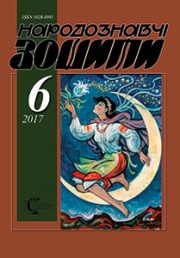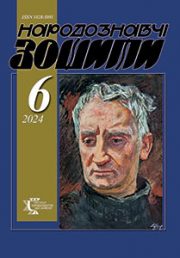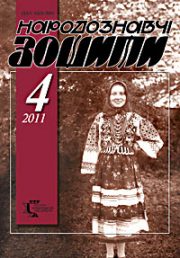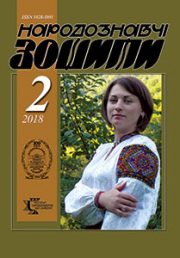The Ethnology Notebooks. 2020. № 3 (153), 594—604
UDK 821.161.2-32.09″19″:[343.261-052:323.28](477.83+477.86)
DOI https://doi.org/10.15407/nz2020.03.594
KRAVTSOVA Galina
ORCID ID: https://orcid.org/0000-0002-3774-1481
Candidate of Philology
Junior research folklore department
of the Institute of Ethnology of the National Academy
of Sciences of Ukraine,
Svobody ave., 15, 79000,
Lviv, Ukraine
Contacts: e-mail: galynamagas@gmail.com
Abstract. An important aspect of life and development of the Ukrainian nation is the broad cultural discourse on the issue of Soviet totalitarianism, the creation of a coherent Ukrainian memory base. It should certainly be based on the narratives of former political prisoners. In view of this, the main idea of the proposed intelligence is focused on the individual modes of survival of Ukrainian political prisoners in the human-killing system of the GULAG — subject-emotional and spiritual markers, exploring them as one of the means of self-preservation during the place of physical, psychological and mental destruction of the individual.
Ubject-emotional markers in this context are tangible values created in captivity, which evoke certain positive feelings, a sense of «one’s» microp space in an «alien» macro-space. These include rosaries, images, drawings, leaflets, embroidery, needlework and more. The second category is intangible. These are: traditional rituals for religious holidays, songs, spiritual practices (collective prayers, liturgies), etc. A study of the motif-like system of folk prose about subject-emotional and spiritual national markers of political prisoners demonstrates its rooting in tradition. The closeness of stories and narratives to Ukrainian folk culture is evidenced by the sacramental codes in the texts: concepts, images, archetypes, motives. At the same time, they reflected the latest national-patriotic spirit. The analysis of the poetics of works reveals the functions of prison creativity, which contributed to the preservation of fundamental social identities — representative, consolidating, axiological, expressive, psychotherapeutic, protest. Thus, the texts are not only a striking expression of the folk philosophy of the period in which they were produced, they show the peculiarities of the values system of that time, they are an organic component of the treasury of nation-wide literary heritage.
The main attention in the article is paid to motives and images. It is noted that the texts are characterized by traditionalism both at the level of ideas and poetics. The basis of the article is the author’s field materials.
Keywords: story, motive, image, national specificity, political prisoner.
Received 19.05.2020
REFERENCES
Pukhonskaya, O. (2016). Literary dimension of the Gulag in the novel Les Knights of Love and Hope by Lesya Romanchuk. Scientific Bulletin of the Mykolayiv National University named after VA Sukhomlinsky. Series: Philological Sciences, 2, 98—202 [in Ukrainian].
Tolstaja, S. (2012). Bread. Slavic antiquities (Vol. 5). Moskva [in Russian].
Datsenko, S. (2019). Faith in captivity. From the personal narratives of the Gulag prisoners in the memorial stock collection. The Military Meridian (Issue 1 (23), pp. 62—71). Kyiv [in Ukrainian].
Demian, G. (2003). Ukrainian Insurgent Songs of the 1940s—2000s (historical and folklore study). Lviv [in Ukrainian].
Lunio, E. (1999). People and Motherland in the rebel songs (based on factual materials from Yavoriv region). The Ethnology Notebooks, 3, 323—325. Lviv [in Ukrainian].
Korchak, D. (2018). What you saw and experienced: memories of a political prisoner. Strey [in Ukrainian].
Sumtsov, N. (1888). Essays on the History of South Russian Apocryphal Tales and Songs. Kyiv [in Russian].
Ivannikova, L. (2012). Biblical symbols in Ukrainian folklore: Jerusalem Golgotha the fire of grace. Mythology and folklore (Pp. 5—15). Lviv [in Ukrainian].
Kachmar, M. (2018). The archetype of folklore. Ukrainian Folklore Encyclopedia. Lviv [in Ukrainian].
Kravtsova, G. (2014). The poetic dimension of rebel prison songs. The Ethnology Notebooks, 4, 754—759. Lviv [in Ukrainian].
Kuzmenko, O. (2018). Dramatic Being of Man in Ukrainian Folklore: Conceptual Forms of Expression (the First and Second World Wars). Lviv [in Ukrainian].
Kis, O. (2017). Ukrainian women in the GULAG: survival means victory. Lviv: Institute of Ethnology; NAS of Ukraine [in Ukrainian].
Sorochuk, L. (2015). Ethno-cultural tradition of Ukrainianness in the context of world cultural space. Ukrainian almanac (Issue 18, pp. 252—256). Kyiv [in Ukrainian].
Potikevich-Zabolotnaya, M. (1996). We very much need to live. Ternopil [in Ukrainian].
Sokil, V. (2017). Folklore prose about the Holodomor of the XX century in Ukraine: the paradigm of the text. Lviv [in Ukrainian].
Ovsyanyk, Y. (2017). Warm clouds of Peter Obal. Retrieved from: https://zbruc.eu/node/66488 [in Ukrainian].
Kis, O. (2016). Creativity of Ukrainian political prisoners in the Gulag. Folk creativity and ethnolog, 3, 51—59 [in Ukrainian].
Kochergina, S. (1998). Fates of Galician political prisoners and allegorical symbolism in their camp products (on the materials of the exhibition «Military-historical monuments, 2001). LIM Scientific Papers (Vol. 7, pp. 283—295). (Electronic resource). Retrieved from: https://.livejournal.com/223909.html [in Ukrainian].







